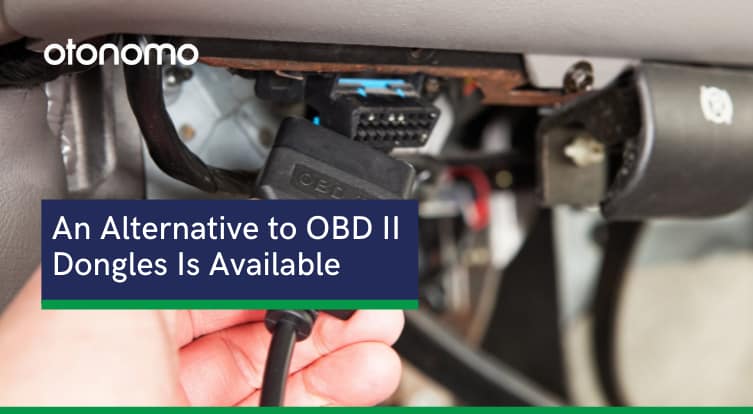Has the time come for an alternative to OBD?
If your fleet still deploys aftermarket connectivity solutions like OBD2 dongles or black boxes the time has come to rethink your position and find an alternative to OBDs. These obsolete solutions not only leave you behind in the market, they also cost you more and give you less compared to the connected vehicle solutions available today.
Old proprietary OBD2 dongles that plug into the vehicle’s onboard diagnostics port or black boxes under the hood are expensive to install and maintain. Compared to the alternative OBD also also has additional limitations:
- OBD dongles are an outdated technology. In a mixed vehicle fleet, existing devices may not fit newer vehicle models, especially EVs that typically have no OBD2 port at all. As OEMs keep developing and updating their car systems you may end up with only a portion of your vehicles connected, reducing the gains that you can achieve from your fleet connectivity.
- OBD dongles pose a security risk. External hardware, especially low-cost devices, pose huge cybersecurity risks. According to Upstream Security, aftermarket devices serve as an entry point for hackers to penetrate either the vehicle itself, the telematics backend servers, or even the company’s IT network.
- High fixed costs. With significant upfront investment and recurring expenses throughout their operating life, OBD dongles add to the fixed-cost of your fleet’s budget, regardless of vehicle kilometers/miles traveled or actual data utilization.
What are the Constraints of OBDs?
It is crucial to find alternatives to OBD2. They are time-consuming, require expensive logistics and create a significant logistics burden throughout their entire lifecycle. Even after installation they require tracking, troubleshooting, and periodic replacements of faulty units.
Maintenance and repairs often require the removal or replacing an OBD dongle from the diagnostics port or disconnection of the black box from under the hood, leaving you to make sure that the device is properly reinstalled after each servicing event.
Even as you de-fleet a vehicle replacing OBD requires your attention. As you need to remove them and return them to the fleet manager, and decide if the dongles are still serviceable or need to be scrapped.
For all this, the data from OBD2 dongles is extremely limited. Vehicles today produce a plethora of data from their sensors, and communicate it in near real time, much of it inaccessible to the various aftermarket devices that can produce only a very limited dataset.87
What are the limitations of Bypass OBD2
As connected vehicles become widely available from OEMs, fleets are given access to embedded connectivity through sensors built into the vehicles on the factory floor. These connected vehicle technologies solve many of the OBD II dongle challenges, offering efficient and logistically effortless connectivity, enhanced security, and richer datasets.
Virtually every fleet manager we meet immediately sees the value proposition of fully connected vehicles as an alternative to OBD.
Do we really need an immediate alternative to OBD dongles?
Are OBD dongles dead? Well not yet, but they are getting there. With solutions like Otonomo’s Vehicle Data Platform that bridges the gap between multiple OEMs and fleet owners and managers with easy, secure data access ready to be utilized to increase efficiency and cut costs.
The limitations of OBD2 dongles compared to embedded connected vehicles are just too great. Connected vehicle data allows fleet operators to quickly access normalized data, across multiple OEMs, through a single integration. The data received is cleaned, normalized. and enriched to create smarter, more useful, data sets at a fraction of the price and operational effort.
As regulations become stricter and more complex, some connected car data may be considered personal data in some geographies where your drivers work. Regulatory compliance—and the associated consent granting and revocation processes for sharing car data—become a major headache. One that Otonomo can help you automate and solve.
Using connected vehicle data also gives you instant access to value-added services, including preventive maintenance, optimizing residual value, automatic parking payment, and more. You can even create additional revenue streams and value by monetizing your fleet’s data.
Looking for an alternative to OBD dongles? Want to gradually and smoothly phase out OBD dongles and black boxes, and make you fleet future proof? Chat to one of our data experts to explore your options.








